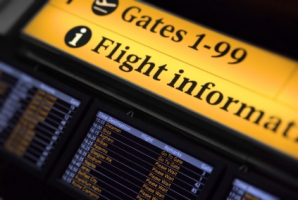OSCE meeting examines ways to facilitate freer movement of people
States have to find ways to promote freer movement of people, in order to facilitate greater human contacts across borders and help promote other basic rights, participants said today at the opening of a two-day OSCE meeting in Vienna.

A departures sign at an airport.
The Supplementary Human Dimension Meeting, organized by the Ukrainian OSCE Chairmanship and the OSCE Office for Democratic Institutions and Human Rights (ODIHR), brought together representatives of governments and civil society organizations focusing on freedom of movement issues from the Organization’s 57 participating States and its Partners for Co-operation.
Ukrainian Ambassador Ihor Prokopchuk, the Chairperson of the OSCE Permanent Council, stressed the importance of freedom of movement as a fundamental right in facilitating human contacts between citizens of the OSCE participating States.
“Freedom of movement encompasses a wide range of issues that concern not only the free movement of people within and across the borders of their own state, but also extend to entry procedures into the territory of states by citizens of other participating States,” Prokopchuk said. “Moreover, freedom of movement is often a pre-requisite for exercising many other rights in the human dimension.”
Ambassador Janez Lenarčič, the Director of ODIHR, pointed out that the importance of promoting greater freedom of movement had been recognized by participating States from the Organization’s beginning, in the Helsinki Final Act in 1975.
“Efforts to promote cross-border mobility and human contacts date back to the start of the Helsinki process, when this area was divided along ideological lines, symbolized by the Berlin Wall,” Lenarčič said. “The Helsinki accords challenged closed borders, and thereby sought to address and overcome divisions in Europe.”
Keynote speaker Marta Cygan, the Director of Strategy in the home affairs department of the European Commission, said it is important to understand that freedom of movement includes a person’s right to leave, return to and move freely within his or her own state.
“Practices such as systems of residency registration should be designed so as to assure that the rights of all citizens to freedom of movement are respected,” Cygan said.
Over the meeting’s three sessions, participants were to discuss and make recommendations on ways to deal with challenges in implementing commitments they had made to promote freedom of movement, on strengthening co-operation in promoting cross-border human contacts, and on innovative approaches to facilitating cross-border mobility.
Source: Organization for Security and Co-operation in Europe
- 492 reads
Human Rights
Fostering a More Humane World: The 28th Eurasian Economic Summi

Conscience, Hope, and Action: Keys to Global Peace and Sustainability

Ringing FOWPAL’s Peace Bell for the World:Nobel Peace Prize Laureates’ Visions and Actions

Protecting the World’s Cultural Diversity for a Sustainable Future

Puppet Show I International Friendship Day 2020

